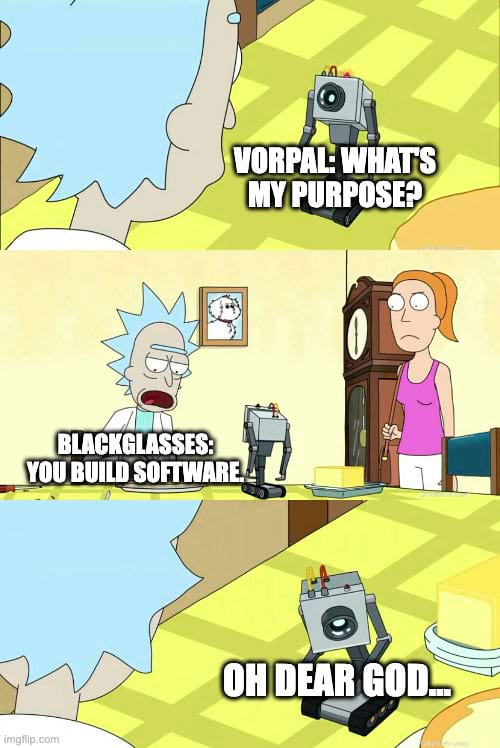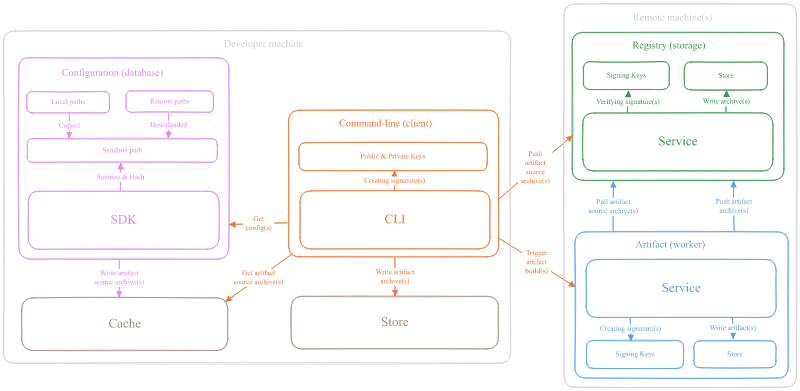1 unstable release
| 0.1.0-alpha | Apr 22, 2025 |
|---|
#12 in #step
101 downloads per month
145KB
4.5K
SLoC
vorpal
Build and ship software with one powerful tool.

Overview
Vorpal uses declarative "bring-your-own-language" configurations to build software distributively and natively in a repeatable and reproducible way.
Examples of building a Rust application in multiple languages:
Rust
use anyhow::Result;
use vorpal_sdk::{
artifact::language::rust::RustArtifactBuilder,
context::get_context,
};
#[tokio::main]
async fn main() -> Result<()> {
// 1. Get context
let context = &mut get_context().await?;
// 2. Create artifact
let example = RustArtifactBuilder::new("example")
.build(context)
.await?;
// 3. Run context with artifacts
context.run(vec![example]).await
}
Go
package main
import (
"log"
"github.com/ALT-F4-LLC/vorpal/sdk/go/internal/artifact/language"
"github.com/ALT-F4-LLC/vorpal/sdk/go/internal/config"
)
func main() {
// 1. Get context
context := config.GetContext()
// 2. Create artifact
example, err := language.
NewRustBuilder("example").
Build(context)
if err != nil {
log.Fatalf("failed to build artifact: %v", err)
}
// 3. Run context with artifacts
context.Run([]*string{example})
}
Python
from vorpal_sdk.config import get_context
from vorpal_sdk.config.artifact.language.rust import rust_artifact
def main():
# 1. Get context
context = get_context()
# 2. Create artifact
example = rust_artifact(context, "example")
# 3. Run context with artifacts
context.run([example])
if __name__ == "__main__":
main()
TypeScript
import { getContext } from '@vorpal/sdk';
import { RustArtifactBuilder } from '@vorpal/sdk/config/artifact/language/rust';
async function main() {
// 1. Get context
const context = await getContext();
// 2. Create artifact
const example = await new RustArtifactBuilder('example')
.build(context);
// 3. Run context with artifacts
await context.run([example]);
}
main().catch(console.error);
Components
Below is the existing working diagram that illustrates the platform's design:
[!CAUTION] This design is subject to change at ANY moment and is a work in progress.
Artifacts
Vorpal uses artifacts to describe every aspect of your software in the language of your choice:
Artifact {
// name of artifact
name: "example".to_string(),
// source paths for artifact
sources: vec![
ArtifactSource {
name: "example", // required, unique per source
excludes: vec![], // optional, to remove files
hash: None, // optional, to track changes
includes: vec![], // optional, to only use files
path: ".", // required, relative location to context
}
],
// steps of artifact (in order)
steps: vec![
ArtifactStep {
entrypoint: Some("/bin/bash"), // required, host path for command (can be artifact)
arguments: vec![], // optional, arguments for entrypoint
artifacts: vec![], // optional, artifacts included in step
environments: vec![], // optional, environment variables for step
script: Some("echo \"hello, world!\" > $VORPAL_OUTPUT/hello_world.txt"), // optional, script passed to executor
},
],
// systems for artifact
systems: vec![Aarch64Darwin, Aarch64Linux],
// target
target: Aarch64Darwin
};
Artifacts can be wrapped in language functions and/or modules to be shared within projects or organizations providing centrally managed and reusable configurations with domain-specific overrides (see examples in overview).
Sources
Coming soon.
Steps
Steps provided by the SDKs are maintained to provide reproducibile cross-platform environments for them. These environments include strictly maintained low-level dependencies that are used as a wrapper for each step.
[!NOTE] Vorpal enables developers to create their own build steps instead of using the SDKs which are provided to handle "common" scenarios.
Linux
On Linux, developers can run steps in a community maintained sandbox which is isolated similiar to containers.
The following are included in the sandbox:
bashbinutilsbisoncoreutilscurldiffutilsfilefindutilsgawkgccgettextglibcgrepgziplibidn2libpsllibunistringlinux-headersm4makencursesopensslpatchperlpythonsedtartexinfounziputil-linuxxzzlib
macOS
Coming soon.
Windows
Coming soon.
Systems
Coming soon.
Development
Requirements
macOS
On macOS, install the native tools with Xcode:
xcode-select --install
Linux
On Linux, install dependencies with the distro's package manger (apt, yum, etc):
[!IMPORTANT] If you are using NixOS, there is a
shell.nixconfiguration included for the development environment.
bubblewrap(sandboxing)curl(downloading)docker(sandboxing)protoc(compiling)unzip(downloading)
The helpful ./script/debian.sh used for setting up systems in continuous integration can also be used to setup any similiar Debian-based systems.
Setup
The helpful ./script/dev.sh used to run development commands in an isolated way without having to update your environment.
[!IMPORTANT] If you are using NixOS, there is a
shell.nixconfiguration included for the development environment.
The following installs missing dependencies then runs cargo build inside the development environment:
$ ./script/dev.sh cargo build
Direnv
To develop inside the environment the supported solution is to use direnv which manages all of this for you. Direnv will automatically run "./script/dev.sh" under the hood and export environment variables to your shell when you enter the directory.
Once you've installed direnv on your system navigate to Vorpal's source code and run:
$ direnv allow
Testing
At this point, you should be able to run cargo build successfully in the repository. If that doesn't work, go back to "Setup" and verify you have done all the required steps.
These steps guide how to compile from source and also test compiling Vorpal with Vorpal.
- Build without Vorpal:
make build
- Run the initial install script, which will create all relevant directories and permissions needed to run the next steps.
[!CAUTION] This step requires access to protected paths on your host filesystem. As such, it will likely require
sudoprivileges (or your system's equivalent) to run.
bash ./script/install.sh
- Generate keys for Vorpal:
./target/debug/vorpal keys generate
- Start services for Vorpal:
./target/debug/vorpal start
- Build with Vorpal:
./target/debug/vorpal artifact --name "vorpal"
The entire stack of has now been tested by building itself.
Makefile
There is makefile which can be used as a reference for common commands used when developing.
Here are some frequently used:
make(default build)make lint(before pushing)make dist(package in./distpath)make vorpal-start(runs services withcargo)make vorpal(builds vorpal-in-vorpal withcargo)
Dependencies
~6–14MB
~158K SLoC
